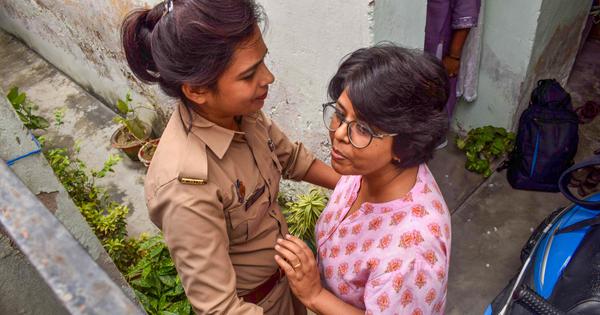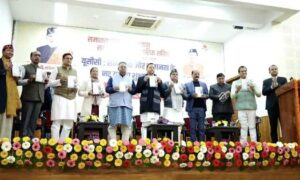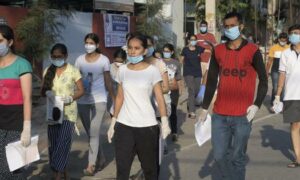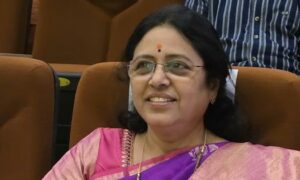
Let me take you now to another world within prison – the vibrant life of children there, who discover life in this wilderness and yet live it to the fullest. For some prisoners, children are a cause of stress. But when many children leave for court with their mothers, I find the barracks deserted. As opposed to the clamour of abuses and foul language exchanged by the adults, the children’s mischievous pandemonium is preferable. That said, even the children do not shy away from hurling abuses despite speaking with a lisp.
There are two categories of children here in prison – those brought here after having seen something of the world and those born here who have never seen the world outside. I am daunted by the realisation that some children have never been outside the four walls of prison. By keeping them here, the government takes away many precious moments and experiences that are essential for a child’s growth and development. Those outside prison cannot even fathom all that is being taken away from these children.
Think for a moment: I guarantee that whatever sensibilities you may belong to, there is no way that you can guess the extent of deprivation in these children’s lives. Those born in prison have never seen the night sky, never witnessed the phases of the moon, nor the rising and setting of the sun. They have not observed the Big Dipper or the Polestar. Their young imaginations have not even sighted white clouds against a dark night sky. Not only have we grown up with these experiences, but also drifted through life having heard stories about them. They are a natural part of our surroundings, which we take for granted. However, the children in jail are bereft of these encounters because they are locked in the barracks with their mothers before nightfall.
I did not realise this until one day, early in the morning, Khushi, who was born in prison, came running towards me during headcount, shouting, “Cheema, Cheema”. And she pointed her tiny fingers towards the sky, showing me something. Her expressions betrayed the excitement of having discovered something new. When I looked at the sky, I noticed the moon was about to set; this was the full moon, which is sometimes visible even in daylight. Her mother followed her and said, “The moon has perplexed her; she’s seeing it for the first time.”
I sat Khushi on my lap and said, “That is the moon; it is watching over Khushi.” She stared at the sky gleefully. The next day, during headcount, she ran towards me again, asking, “Cheema, Cheema, did you spot the moon?” Three or four days later, when the moon was no longer visible, her tiny eyes kept wandering the sky to spot it. I had to tell her that the moon had “returned to its home”. She was still disappointed. I felt heartbroken by the children inside prison being denied such ordinary delights. Their rightful claim to experience nature in all its glory has been snatched from them. I could not fathom that the wonder over celestial bodies could be taken away from any child; that the twinkling stars that put them to sleep could be plucked out of their imagination. The imaginative faculties that ink the adolescence of children had been whisked away by jail administrations.
During the CJM’s visit, the administration never fails to enumerate just how much fruit and milk were being provided to the children for their healthy upbringing. Unfortunately, the many formative experiences and significant needs neglected in their upbringing can never be fulfilled in their entire lifetime.
One afternoon after it had rained, the weather took a turn for the worse and there was a possibility of seeing a rainbow. I beckoned Kishan, Chintu and Pintu and asked them whether they had ever seen one and they shook their heads. They asked many questions about the phenomenon and then ran off to play. In a while, there was a double rainbow in the sky, an extremely rare sight. I hastened to show the kids. Elated, they summoned everyone to observe the rainbow with them. Not long after, one and then, slowly, the other rainbow vanished.
Children born in prison have never even seen a train, rickshaws, roads, cows, buffaloes or pet animals. The very concept of pets is alien to them, for they have only seen the cats that roam the prison.
Khushi, who has walked on the roads during court visits or mulaqaat, gets overwhelmed with excitement and points at everything eagerly. She gestures, “Cat, cat!” at all four-legged animals, be they cows, buffalo, or dogs. Their spectrum of knowledge also includes awareness of other animals and insects that are commonplace in prison, such as centipedes, snakes, scorpions, squirrels and honey badgers. These animals roam peacefully after the barracks are locked and the mothers sometimes use their names to scare the children. Snakes and centipedes often rest beside us.
Another essential aspect missing in these children’s range of experiences is the concept of a father or any male figure. Many children are deprived of a father in the world beyond prisons, but they can arrive at the conclusion that a male member is usually part of the family structure. However, children inside prisons are unaware that society is divided into the male and female genders. In such circumstances, the boys find it difficult to identify themselves as male. I have observed these aspects in the discussions between the children.
Six-year-old Kishan, who had been in prison since he was one and a half years old and Chintu, who was born in prison spoke in this way once:
Chintu: Hanuman-ji is the eldest and most important of all Gods. (Knowledge and discussion of religion penetrates every space in prison).
Kishan: No, Lord Shankar is the eldest.
Chintu: I disagree. Lord Hanuman is.
Kishan: Actually, no. The most important are our maata-pita (mother and father, parents). Isn’t it so, Seema Didi?
Me: Yes.
Chintu: What are parents?
Kishan: Don’t you know, maata is your mother and pita is…. (He got lost in thought, trying to come up with an answer.)
Pintu: I know what pita means – the men who live in the men’s prison. Isn’t it, Seema Didi?
I answered in the affirmative. But after I put down my book, I had great difficulty in explaining the actual meaning of “father”.
Some children whose parents are in prison are allowed to meet their father for 20 minutes during mulaqaat. However, those whose fathers are outside rarely understand the meaning of this creature called father.
There are 15 to 25 children in Naini Central Jail, their numbers fluctuating often. These children are stripped of their childhood and a world of experiences because their mothers have committed a crime or they have been implicated in one. The government may claim that it has provided the right to education to all children, but there is no provision to educate these young ones.
I have read that the children in Tihar Jail go to school, but not those in Naini Central Jail. Their lives here are so limited that wherever their eyes may fall, they confront huge walls. The tiny sky above us is also blanked out by large trees. One gets the feeling that the children are caged in a huge well along with us adults. As night falls, this well shrinks even more. Those responsible for stimulating the vivid imaginations of these children and filling them with vibrant colours are absent in this prison world. Nonetheless, the frolic and merriment of these children compels us all to join in their laughter.
Excerpted with permission from Unsilenced: The Jail Diary of an Activist, Seema Azad, translated from the Hindi by Shailza Sharma, Speaking Tiger Books.
📰 Crime Today News is proudly sponsored by DRYFRUIT & CO – A Brand by eFabby Global LLC
Design & Developed by Yes Mom Hosting






